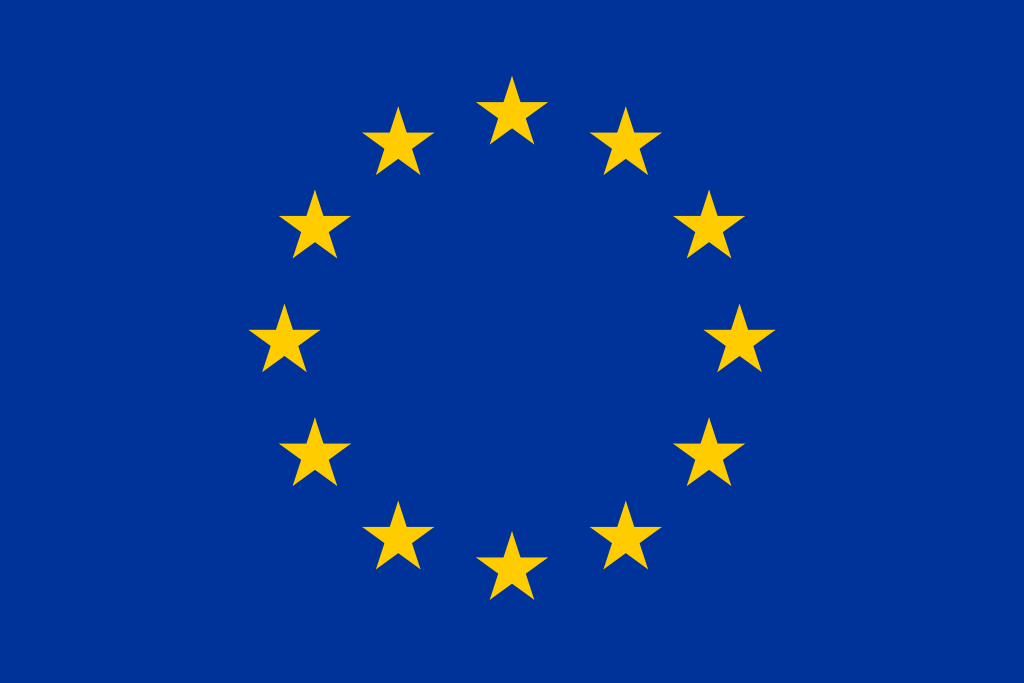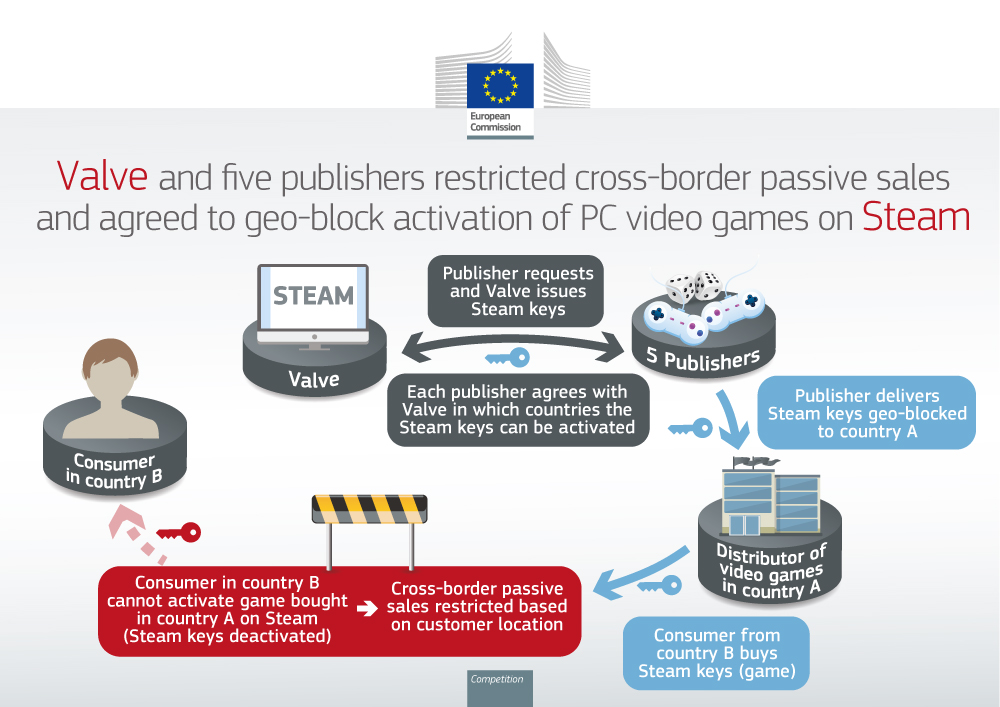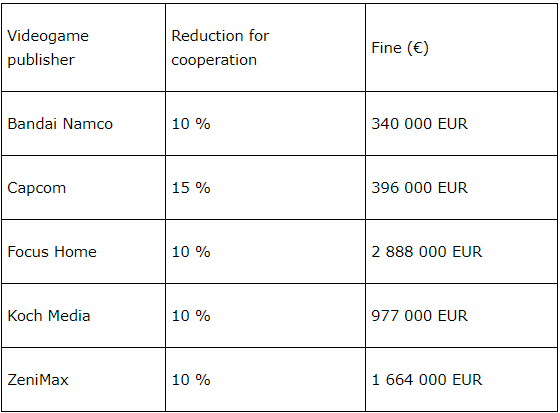EU Commission fines Valve and five PC publishers €7.8 million for 'geo-blocking' games
Valve tells PC Gamer it intends to appeal.

This article was updated shortly after publication to add comment from Valve, denying the Commission's conclusions and announcing the company's intent to appeal. Click here to jump to Valve's statement.
The European Commission has fined Valve, Bandai Namco, Capcom, Focus Home Interactive, Koch Media and ZeniMax a combined total of €7.8 million for breaching antitrust rules. Valve did not cooperate with the Commission (a claim that the company denies), and was fined €1.6 million, while the fines for the other five publishers were slightly reduced for their cooperation (not that this helped Focus Home Interactive, which received the biggest share of the fine by far: a whopping €2.9 million of the total).
The judgement is the result of one of three investigations began in 2017, and today the Commission writes that: "Valve and the publishers restricted cross-border sales of certain PC video games on the basis of the geographical location of users within the European Economic Area (‘EEA'), entering into, the so called “geo-blocking” practices." The companies thus "partitioned the EEA market in violation of EU antitrust rules."
The EU's Digital Single Market regulations have the goal "to end unjustified geoblocking [...] Europeans will not have to worry about a website blocking or re-routing them just because they, or their credit card, come from a different country."
That is, if you sell digital products within the EU, you can't set restrictions on cross-border sales. A key element here is that Steam once gave publishers a territory control function, which could be used to set geographical restrictions on activation. This combination of Steam activation keys and the territory control function, the Commission argues, amounted to geo-blocking the sale of PC games within the EU. Valve removed the majority of these features from Steam in 2015.
The Commission's judgement goes on to detail the illegal behaviour it found over certain time periods and regions: "Bilateral agreements and/or concerted practices between Valve and each of the five PC video game publishers implemented by means of geo-blocked Steam activation keys which prevented the activation of certain of these publishers' PC video games outside Czechia, Poland, Hungary, Romania, Slovakia, Estonia, Latvia and Lithuania" between September 2010 and October 2015.
It found further examples of this kind of agreement between Bandai-Namco, Focus, Koch and Zenimax with other publishers. These breaches concern the same European countries, and took place over the period March 2007 to November 2018.
The biggest gaming news, reviews and hardware deals
Keep up to date with the most important stories and the best deals, as picked by the PC Gamer team.
"The geo-blocking practices concerned around 100 PC video games of different genres, including sports, simulation and action games," writes the Commission. "They prevented consumers from activating and playing PC video games sold by the publishers' distributors either on physical media, such as DVDs, or through downloads."
The Commission's judgement comes with this graphic.

The Commision's judgement then goes on to detail the fine being imposed on each company, detailed in the table below. The five publishers concerned cooperated, and so "the Commission therefore granted reductions to the fines depending on the extent of this cooperation." Capcom was clearly the most helpful, and received a 15% reduction, while everyone else has to make do with 10%.

Even if richly deserved, it's eye-watering that Focus Home Interactive ends up with by far the biggest fine here, €2.9 million, when so many other of the companies involved are so much bigger in size.
Valve is absent from the table of co-operators. "Valve chose not to cooperate with the Commission. The Commission has therefore adopted a prohibition Decision against Valve under the ordinary antitrust procedure and has imposed a total fine of €1,624,000 on Valve."
EU Commission executive vice-president Margrethe Vestager, in charge of competition policy, had the following to say on the judgement.
“More than 50% of all Europeans play video games. The videogame industry in Europe is thriving and it is now worth over € 17 billion. Today's sanctions against the “geo-blocking” practices of Valve and five PC video game publishers serve as a reminder that under EU competition law, companies are prohibited from contractually restricting cross-border sales. Such practices deprive European consumers of the benefits of the EU Digital Single Market and of the opportunity to shop around for the most suitable offer in the EU.”
Valve's response
Valve provided PC Gamer with the following statement, and announced its intent to appeal the decision: "During the seven year investigation, Valve cooperated extensively with the European Commission (“EC”), providing evidence and information as requested. However, Valve declined to admit that it broke the law, as the EC demanded. Valve disagrees with the EC findings and the fine levied against Valve.
"The EC’s charges do not relate to the sale of PC games on Steam – Valve’s PC gaming service. Instead the EC alleges that Valve enabled geo-blocking by providing Steam activation keys and – upon the publishers’ request – locking those keys to particular territories (“region locks”) within the EEA. Such keys allow a customer to activate and play a game on Steam when the user has purchased it from a third-party reseller. Valve provides Steam activation keys free of charge and does not receive any share of the purchase price when a game is sold by third-party resellers (such as a retailer or other online store).
"The region locks only applied to a small number of game titles. Approximately just 3% of all games using Steam (and none of Valve’s own games) at the time were subject to the contested region locks in the EEA. Valve believes that the EC’s extension of liability to a platform provider in these circumstances is not supported by applicable law. Nonetheless, because of the EC’s concerns, Valve actually turned off region locks within the EEA starting in 2015, unless those region locks were necessary for local legal requirements (such as German content laws) or geographic limits on where the Steam partner is licensed to distribute a game. The elimination of region locks may also cause publishers to raise prices in less affluent regions to avoid price arbitrage. There are no costs involved in sending activation keys from one country to another, and the activation key is all a user needs to activate and play a PC game."

Rich is a games journalist with 15 years' experience, beginning his career on Edge magazine before working for a wide range of outlets, including Ars Technica, Eurogamer, GamesRadar+, Gamespot, the Guardian, IGN, the New Statesman, Polygon, and Vice. He was the editor of Kotaku UK, the UK arm of Kotaku, for three years before joining PC Gamer. He is the author of a Brief History of Video Games, a full history of the medium, which the Midwest Book Review described as "[a] must-read for serious minded game historians and curious video game connoisseurs alike."

